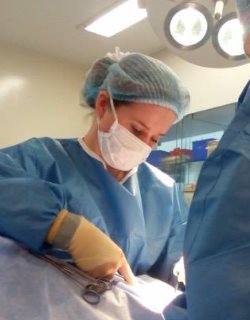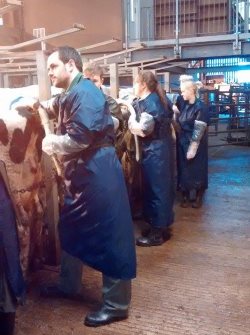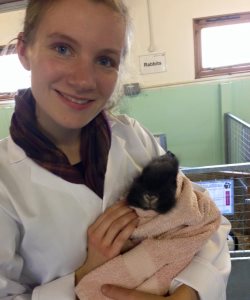Not all of our veterinary students come to us directly from school. Indeed, some of our best students already have degrees, or are older, and we set aside places especially for such applicants. Some even come to us via another course at Cambridge.
‘Affiliated’ applicants (applicants who already hold a degree)
We enthusiastically welcome applications from candidates who already have a degree, and we would like to take around six such applicants each year – although there is considerable flexibility in this number.
We strongly encourage potential affiliated applicants to discuss their application in advance with the college to which they are thinking of applying, so they can be given advice about how best to proceed. Further information is provided at this link.
They should apply to one of the three colleges with particular experience of considering affiliated vet applications, and supporting such students once they start the vet course - Lucy Cavendish, St Edmund's and Wolfson.
 Finance is particularly important to applicants who apply having already gained a degree. We are pleased to announce that affiliated vet students are now eligible for the Cambridge Bursary Scheme. Also, you should read the information under the ‘Help with your finances’ menu tab and bear in mind that tuition fee loans are usually now available for second degrees. Some colleges can also provide entrance bursaries of up to £10,000-20,000 – see individual college websites for details.
Finance is particularly important to applicants who apply having already gained a degree. We are pleased to announce that affiliated vet students are now eligible for the Cambridge Bursary Scheme. Also, you should read the information under the ‘Help with your finances’ menu tab and bear in mind that tuition fee loans are usually now available for second degrees. Some colleges can also provide entrance bursaries of up to £10,000-20,000 – see individual college websites for details.
“Applying for veterinary medicine as a graduate is daunting, both financially and in terms of the time commitment - when you're well on your way to thirty and *still* at uni, friends and family do raise eyebrows! That said, Cambridge is great place to come. Not only do you benefit from the full five years of a veterinary education (rather than having to cram in an accelerated course) but the year group sizes, compared with other unis, are tiny so the resource availability is brilliant.” - Emma
Mature (i.e. over-21) applicants without a prior degree
We also welcome applications from candidates without a degree, but who are classed as 'mature' (i.e. over 21 on the day they would start the course). Each year we allocate a number of places on the course for mature candidates.
We strongly encourage potential mature candidates to discuss their application in advance with the college to which they are thinking of applying, so they can be given advice about how best to proceed.
 Mature applicants can apply to any college, but you should give thought to applying to one of the two colleges with particular experience of considering mature vet applicants, and supporting such students once they start the vet course - St Edmund's and Wolfson.
Mature applicants can apply to any college, but you should give thought to applying to one of the two colleges with particular experience of considering mature vet applicants, and supporting such students once they start the vet course - St Edmund's and Wolfson.
Mature students are entitled to, in some cases, a higher level of the Cambridge Bursary – for full information, see this link.
"Having been out of formal education for 13 years I thought I would really struggle to cope at Cambridge. Although it was hard, the high staff-to-student ratio supervisions made a big difference. They helped me understand the material better but also to develop a critical thinking approach. They encourage you to learn not only 'what' and 'how' but ask 'why' as well." - Paddy
'Transfer’ applicants already studying another science course at Cambridge
If numbers permit, we may also admit students onto the Veterinary Medicine course who have already embarked on another science course at Cambridge. In the past, this has happened after those students’ first year is successfully completed.
It is important to realise that this process is not really a ‘transfer’ – it is more like a new ‘admission’ and involves re-starting the vet course in the first year. Thus, potential re-starters should contact their funding body to ensure they will have funds for the whole course.
If the move is made after one year, then this will mean a total stay of seven years at Cambridge. This is the same as the minimum time in which a Cambridge scientist could graduate and then complete the very fastest-track graduate vet courses elsewhere. However, the Cambridge ‘re-start’ route comes with the certainty of a Veterinary Medicine place after just one year at university.
Students interested in taking this route should contact (1) their college tutor, (2) the Admissions Convenor in Veterinary Medicine (db125@cam.ac.uk) and (3) their source of funding as soon as possible. Instigation of any ‘transfer’ would require the approval of the applicant’s college Senior Tutor and Director of Studies in Veterinary Medicine (where one exists). An ‘admissions-like’ process will then be arranged. You can apply to ‘re-start’ in Veterinary Medicine without prejudice to your place on your current course.
 Many Cambridge science and engineering students will find that they satisfy the academic requirements for Veterinary Medicine, as long as they have taken A-level Chemistry, or equivalent. To date, students have 'transferred' into the course from Natural Sciences (physical more often than biological, interestingly), Engineering and Computer Science.
Many Cambridge science and engineering students will find that they satisfy the academic requirements for Veterinary Medicine, as long as they have taken A-level Chemistry, or equivalent. To date, students have 'transferred' into the course from Natural Sciences (physical more often than biological, interestingly), Engineering and Computer Science.
Please note: that this route is not recommended for potential applicants to the University. For them, applying directly to the veterinary course carries the greatest chance of success, the shortest course, and the lowest financial cost.
“I switched onto the Veterinary Medicine course after a year of studying Natural Sciences, and I can honestly say it's the best decision I've ever made. I was worried about not having as much animal handling experience as the rest of my cohort, but Cambridge are excellent at teaching not only the science but the animal handling and husbandry. They recognise that everyone has different levels of experience and I even had one-to-one handling sessions. There have been so many amazing moments so far, from dissecting a horse in the post mortem room, to studying live anatomy with the (adorable) vet school greyhounds, and even meeting alpaca babies at one of the many events hosted by the Cambridge University Veterinary Society. It's a fascinating course and there's never a dull moment!” - Lily

